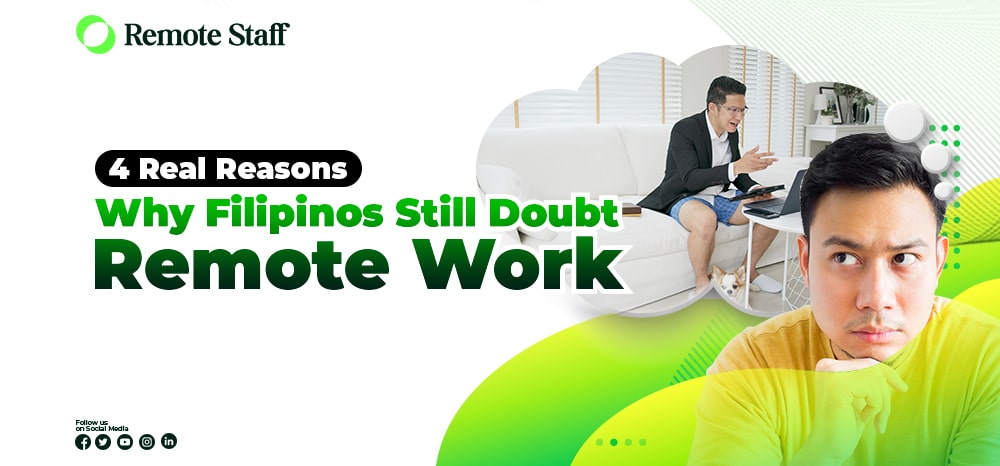Before the pandemic, few Filipinos have heard of remote work, much less working under this setup. Fast forward to 2020, and it is suddenly a part of the “new normal.” It quickly proved itself an equal to, and sometimes even better than, a traditional work setup.
And yet, despite having worked on this setup for two years now, many Filipinos remain skeptical of remote work. They continue to view online jobs simply as a stand-in for their traditional counterparts until the pandemic is over.
But why is that? Why do many Filipinos continue to doubt the validity of remote work? To answer this question, here are four reasons why many Filipinos continue to reject remote work as a legitimate way of working.

Many Continue to See Remote Work as Not “Real” Work.
Perhaps the primary reason why Filipino workers continue to doubt remote work is because they don’t see it as “real” work. For them, “real” work involves commuting to your workplace, meeting your co-workers in person, being more physically active at work, and working in an office. You know, a traditional work setup.
A remote work setup, in contrast, doesn’t require any of those. It is perfectly viable for you to work in your pajamas right after waking up in the morning if that’s what you prefer. Also, your home is now your office, removing the boundaries that separate your home life from your work.
These traits of remote work can be offputting to workers used to a traditional setup. It ruins their rhythm and turns their work ethic upside down. The more traditionalist Filipino workers may complain that remote work isn’t hard enough to be called work either. Seeing that you don’t need to struggle commuting and seeing your boss and annoying co-workers.

The Poor State of Internet Connection in the Country.
Of course, we can’t talk about remote work without discussing the current state of Philippine internet. Despite the improvements in the country’s internet speeds, many areas remain unable to access the internet. Those who have access to the internet have to contend with fluctuating internet speeds and sudden loss of connectivity.
Because of these issues, many Filipino workers are hesitant about the viability of remote working. After all, how could they work in their online jobs if their internet connection is constantly hampering them?
Fortunately, there are options available to us to somewhat remedy this issue. You can get pocket wifi, so you have an alternative source of internet connection. However, doing this means additional expenses, something many Filipinos aren’t keen on. You can also try getting a plan with an improved internet connection, though that means paying more for the internet.

They’re Concerned That Remote Work Isn’t Long-term.
Another reason why Filipino workers remain doubtful about remote work is because they don’t believe it’s a long-term setup. This belief stems from the fact that, before the pandemic, many online jobs were either freelance or part-time jobs.
I must admit that before my current work, I also held this concern regarding remote work. Imagine my surprise when I discovered you can work full-time remotely. Not only that, but this opportunity has been available even before the pandemic.
This lack of information regarding the many opportunities available in remote work is a significant reason why many still think remote work isn’t sustainable. Drawing from my experience again, I only discovered my current job because a friend told me about it.

The Risk of Employers Exploiting You.
A growing concern for Filipino workers considering remote work is the risk of getting exploited by their employers. Sure, there’s also a risk of exploitation in a traditional work setting. But at least you can confront your boss about it in person. In remote work, all you can do is contact them via e-mail and hope for the best.
One common way that unscrupulous employers can abuse their remote employees is by giving them challenging tasks to be accomplished on a short deadline. You’re working at home anyway. Surely you can finish writing a ten thousand word article within the day, right?
Aside from this, you can also find your salary late or reduced if you are hired via an outsourcing company. This is due to your outsourcing company taking their cut for recommending you to your employer. Fortunately, instances of this are rare. Most outsourcing companies, such as Remote Staff, have a separate fee for their services.

Conclusion.
Despite only becoming a regular part of our vocabulary recently, remote work forever altered the way we view work. For some, online jobs are a blessing. Others, on the other hand, are skeptical about them.
Several factors cause this skepticism, first of which are the preconceived notions regarding remote work. Many still believe that remote work isn’t “real” work, and it’s not a long-term setup. Next, even if they do want to work via online jobs, the Philippines’ poor internet connection remains a significant obstacle.
And last but not least, many Filipino workers are also concerned that their employers may exploit them if they’re working remotely.

